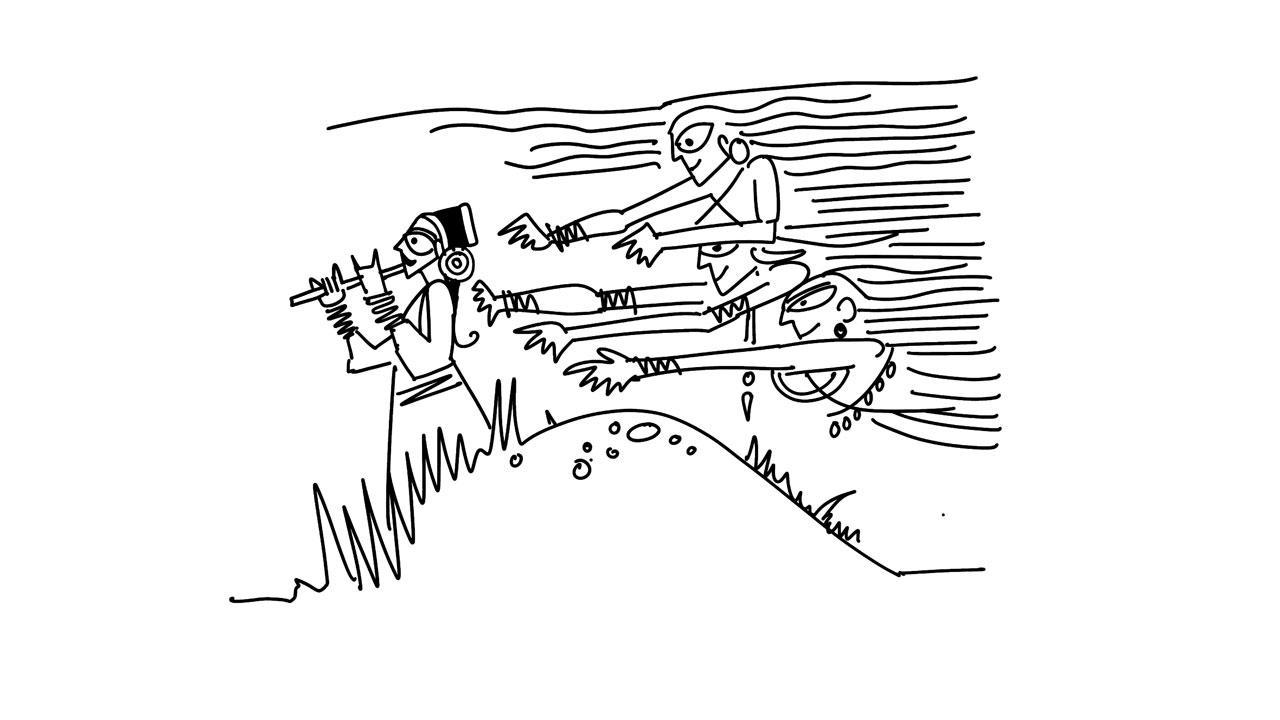And finally, there is the nymph Calypso, who made Odysseus forget all about home and trapped him on an island for seven years

Illustration/Devdutt Pattanaik
 The hills of Garhwal region tell the story of Jeetu Bagadwal, a young handsome man who used to play the flute. He travelled over hills ostensibly to invite his sister to the plough ceremony, but in actuality to meet his lover. On the way he attracted the attention of hill fairies known as Ancheri who were drawn to his music. These magical women wanted to abduct him. The lad begged the Ancheris to wait until he performed the plough rituals, so that there was food for his mother. He gave his word he would return. So after the ceremony and bidding farewell to his mother, his sister and his lover, he kept his word, and let the fairies take him to the fairy land. His tale is still told in Uttaranchal where he has become a folk god, linked with qualities such as integrity, virility and fertility. Young men are warned not to wander the hills alone, singing or making music, wearing bright colours. There are female predators on the hills for men, just as in modern times we speak of male predators for women who venture into the streets alone.
The hills of Garhwal region tell the story of Jeetu Bagadwal, a young handsome man who used to play the flute. He travelled over hills ostensibly to invite his sister to the plough ceremony, but in actuality to meet his lover. On the way he attracted the attention of hill fairies known as Ancheri who were drawn to his music. These magical women wanted to abduct him. The lad begged the Ancheris to wait until he performed the plough rituals, so that there was food for his mother. He gave his word he would return. So after the ceremony and bidding farewell to his mother, his sister and his lover, he kept his word, and let the fairies take him to the fairy land. His tale is still told in Uttaranchal where he has become a folk god, linked with qualities such as integrity, virility and fertility. Young men are warned not to wander the hills alone, singing or making music, wearing bright colours. There are female predators on the hills for men, just as in modern times we speak of male predators for women who venture into the streets alone.
ADVERTISEMENT
The idea of enchanting magical women abducting men is a recurring idea around the world. For example, Odysseus, the great Greek hero, encounters the bird-like sirens. Their songs lure sailors, forcing them to change course and move towards the sirens and crash their ships on the rocks. Then we hear of the witch, Circe, who enchants sailors, offers them hospitality but, in the end, turns them into pigs. And finally, there is the nymph Calypso, who made Odysseus forget all about home and trapped him on an island for seven years.
Similar stories are found in Buddhist lore. We hear of sailors getting shipwrecked on an island, where they meet women who offer them food, clothing, shelter. But over time, the chief of the sailors notices members of his crew disappearing. He realises that he is trapped on an island of man-eating yakshinis. He prays to the Bodhisattva, who appears in the form of a flying horse and takes him out of the island.
In the folk traditions of India, besides Ancheria fairies of the hills, there are forest-nymphs and water-nymphs, who abduct men and let them return if they pay a price—the men return old and withered, stooping on a stick, or without their shadows. Nath-jogi lore speaks of the enchanted forest of yogini women, the Kadalivan (plantain orchard) where all men turn into women.
Women are seen as creatures who emasculate men and to maintain masculinity, one must shun their company. This idea was very popular in the monastic-tantric traditions, where women were seen as forces who can take men’s power. However, using tantric practices, men could overpower this feminine energy, subjugate the women and claim their power through various chants and rituals. These beliefs continue even today. Thus, the idea of women tempting men, that women are responsible for rape and that women have to be domesticated through matrimony and maternity gains ground. Memory of fairies, Ancheria and yogini is why the modern idea of women being liberated and powerful, terrifies many traditionalists.
The author writes and lectures on the relevance of mythology in modern times. Reach him at [email protected]
 Subscribe today by clicking the link and stay updated with the latest news!" Click here!
Subscribe today by clicking the link and stay updated with the latest news!" Click here!







